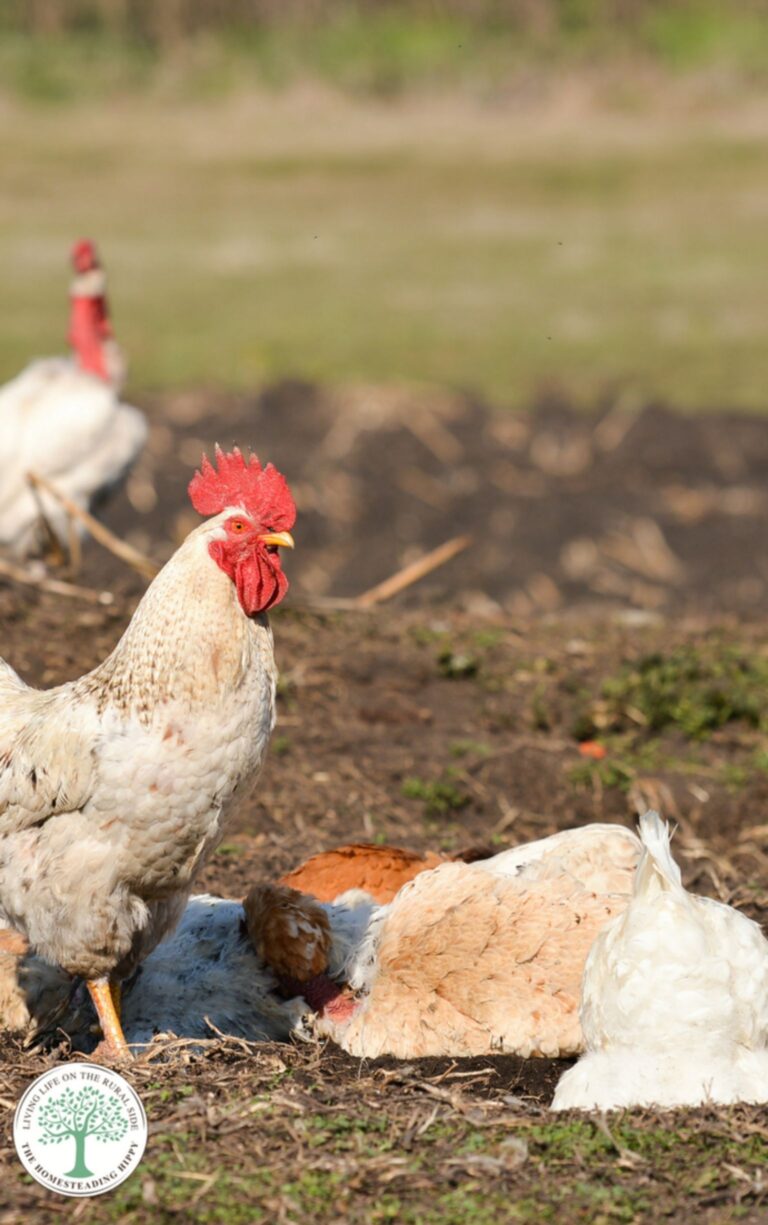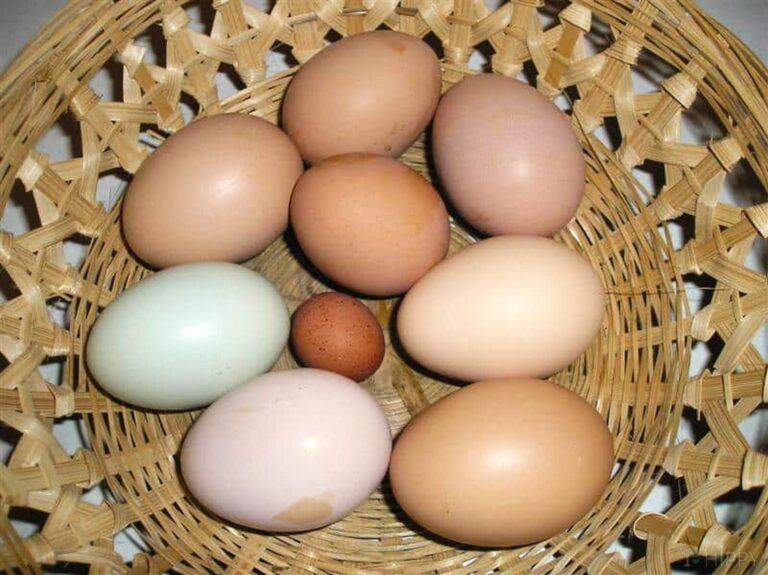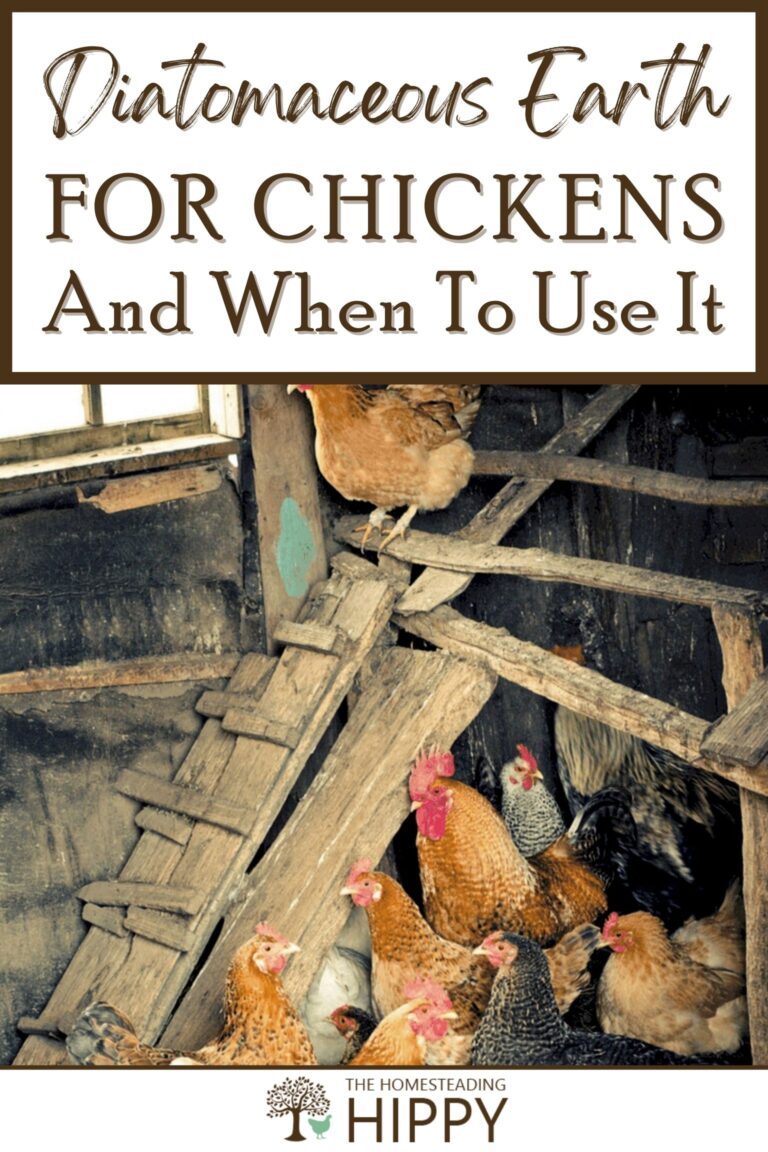If you’re a chicken owner, you may have heard of diatomaceous earth or DE. This natural product can help keep your chickens healthy by killing parasites and providing them with essential minerals and nutrients.

Let’s take a closer look at what DE is and why it’s important for chicken owners to use it.
Table of Contents
What is Diatomaceous Earth?
DE is a fine powder made up of microscopic fossilized remains of ancient aquatic organisms called diatoms.
Despite its name, diatomaceous earth is actually quite light and powdery, and it has a number of unique properties that make it useful for a variety of applications, from helping to rid gardens of pests to being used in food production as an anti-caking agent for grain-based products.
When it comes to chickens, however, the most important benefit of DE is its ability to kill parasites like mites and lice that can make life miserable for your flock.
The tiny particles in DE are sharp enough to cut through the protective coating on parasites like mites and lice, which makes them vulnerable to dehydration and death.
But while DE can be effective at killing these nasty critters, it won’t harm your chickens or other animals because the particles are so small they don’t penetrate the skin.
In addition, DE also provides essential minerals such as calcium carbonate that can help keep your chickens healthy and strong.
Is Diatomaceous Earth Safe For You?
Although diatomaceous earth is considered safe for human use, there are some precautions you should take when handling it.
The most important thing to remember is to wear a dust mask to avoid inhaling the fine powder.
You should also avoid letting the powder come into contact with your skin or eyes, as it can cause irritation. It’s not dangerous, but can give you a bit of a sneezing fit!
When giving diatomaceous earth to your chickens, be sure to sprinkle DE around their coop rather than directly onto them.
This will help to prevent any respiratory problems that might occur if they inhale the powder.
Food-Grade D.E. vs. Filter-Grade D.E.
Food-grade D.E. is often used in supplements and food manufacturing, while filter-grade D.E. is commonly used in swimming pool filters and industrial settings.
Although both types of D.E. are safe for human exposure, filter-grade D.E. may contain higher levels of crystalline silica, which can be harmful if inhaled.
When treating your chickens, always use food-grade D.E. Even if you aren’t directly feeding the diatomaceous earth to your chickens (for instance, if you’re using it in your dust bath), there’s a chance your chickens will eat some of the particles regardless.
Is Diatomaceous Earth Safe for Chickens?
The good news is that DE can be safely used around chickens with few risks involved. However, there are a few things you should keep in mind when using DE around your poultry flock.
First off, only food-grade DE should be used; this type of DE has been specifically treated so that it doesn’t contain any toxic or hazardous chemicals that could harm your birds or other animals.
Always follow the manufacturer’s instructions when applying DE to prevent overuse or misuse of this product.
Can Diatomaceous Earth Hurt Chickens?
Inhaling too much diatomaceous earth can lead to irritation of the respiratory tract, and it can even cause pulmonary edema, a condition in which fluid accumulates in the lungs.
However, most chicken keepers find that as long as they take precautions to avoid breathing in the powder themselves, their flock remains healthy and happy, too.
So the short answer is no – you shouldn’t have to worry about diatomaceous earth harming your chickens in any way.
What Are the Benefits of DE for Chickens?
Here are a few of the biggest benefits of using DE for your chickens.
Digestive Health Benefits
Using DE for chickens can help improve the digestive health of your flock by providing essential minerals that aid in digestion.
DE is rich in silica, silicates, iron oxide, sulfuric acid, and other trace minerals that are beneficial to chicken digestion.
Additionally, DE helps to break down food particles more quickly in the chicken’s stomach which allows them to absorb more nutrients from their food.
This means that your chickens will be healthier and have increased energy levels thanks to improved nutrient absorption.
DE for Chicken Mites and Other Parasites
Another great benefit of using DE for chickens is that it can help reduce the risk of parasites such as mites and lice infesting your flock.
The sharp edges of the diatomaceous earth particles act like tiny knives when they come into contact with parasites on your chickens’ skin or feathers.
This makes it difficult for parasites to attach themselves to your birds, and they will eventually fall off or die due to dehydration caused by the diatomaceous earth particles.
In addition to being a natural pest control solution, using DE can also help reduce the number of chemical pesticides you need to use on your flock which could potentially harm them if used too often or in large quantities.
It is important to note that it’s not just external parasites, like mites and lice, that can be prevented and treated with DE. This is also an effective treatment for internal parasites, like worms.

Egg Production Improvement
Finally, using DE for chickens can also help improve their egg production.
The minerals found in diatomaceous earth are known to help with hormone balance and eggshell strength which both contribute to higher-quality eggs produced by your hens.
In addition, some studies have shown that using DE may also increase egg size since some trace minerals are necessary for proper growth and development in hens during their laying cycle.
By providing these essential minerals through diatomaceous earth, you can ensure that your hens will be healthy and productive layers throughout their entire lives!
Top 3 Diatomaceous Earth Uses for Chickens
Below, we’ll discuss the three main uses for DE in chicken care: dust baths, food supplementation, and coop cleaning.
1. Dust Bath
When chickens take dust baths, they are actually getting rid of external parasites like mites and lice that can make them uncomfortable and unhealthy. Dust bathing also helps them keep their feathers clean and clean.
To make a dust bath for your chickens, simply fill a shallow box or bin with DE and let them roll around in it for about 15 minutes.
This should be done once or twice per week to ensure that your chickens remain free from pests.
2. Chicken Food
Adding DE to your chickens’ feed is a good way to provide extra minerals while also helping control internal parasites like worms.
A good rule of thumb is to add 1 teaspoon per chicken per day to their feed. The minerals in the DE will help keep your chickens healthy while also helping promote strong eggshells and better digestion.
3. Coop
Another great use for DE is as an all-natural cleaner for the coop itself.
Unlike harsh chemical cleaners, DE won’t harm your birds if they come into contact with it—and it’s effective at getting rid of odors and preventing the growth of bacteria on surfaces like roosts and nest boxes.
Simply sprinkle some DE on the floor every time you clean out the coop and sweep it up after about 10 minutes; this will help keep things smelling fresh without harming your birds!
How Much DE Do My Chickens Need?
Here’s a quick overview of how much DE you should be using for your chickens.
How Much Diatomaceous Earth Should I Feed My Chickens?
A general rule of thumb is to provide one teaspoon of diatomaceous earth per chicken per week. If you are using it to control existing parasites rather than prevent new infestations, you may need to increase the amount slightly.
How Much Diatomaceous Earth Do I Put in a Chicken Dust Bath?
A good rule of thumb is 1/2 cup per chicken. For example, if you have four chickens, you would use 2 cups of diatomaceous earth. Add the diatomaceous earth to the dust bath and let your chickens enjoy it!
How Much Diatomaceous Earth Do You Put in a Chicken Coop?
There is no one-size-fits-all answer to this question, as the amount of diatomaceous earth you’ll need to put in a chicken coop will depend on the size of the coop and the number of chickens you have.
However, a general rule of thumb is to add 1/2 cup of diatomaceous earth per chicken. So, if you have a small coop with 10 chickens, you would need to add 5 cups of diatomaceous earth.
Can You Give Chickens Too Much Diatomaceous Earth – And What are the Side Effects?
Diatomaceous earth is safe for chickens to eat, and it works quickly and effectively.
However, some chicken owners worry that they might be giving their chickens too much diatomaceous earth.
While it is possible to give chickens too much of this substance, the side effects are usually not severe.
The most common issue is diarrhea, which can be easily remedied by reducing the amount of diatomaceous earth that the chicken ingests.
In general, as long as you are careful not to overdo it, diatomaceous earth can be a safe and effective way to protect your chickens from parasites.
Alternatives to Diatomaceous Earth
One of the most popular methods of keeping your chickens clean is through the use of diatomaceous earth (DE). It’s a natural material that helps keep chickens free from pests and parasites.
But what if you don’t want to use DE? Are there any alternatives? Let’s look at some other options!
Lime
Lime powder is a great alternative to DE because it’s just as effective in protecting your chickens from parasites.
It works by drying out the skin of any parasites that come into contact with it, thus killing them off.
The downside is that lime powder can be very caustic, so make sure you wear gloves when applying it.
Additionally, it can irritate your chicken’s eyes and respiratory system, so make sure to apply it away from their living areas.
Salt Water Solution
Salt water is an effective way to rid your chickens of parasites because salt is naturally dehydrating.
All you have to do is mix a tablespoon or two of salt into each gallon of warm water and then spray down your chickens with the solution once or twice a week.
This will help keep their skin dry which will repel any parasites looking for a place to take up residence in your coop. However, make sure not to overdo it—too much salt can be toxic for chickens!
Apple Cider Vinegar (ACV) Solution
Apple cider vinegar has many uses, but one that’s often overlooked is its ability to ward off pests on animals such as chickens.
To use it on your flock, simply mix two parts apple cider vinegar with one part water and spray it onto their feathers every couple of weeks or so.
The acidic nature of ACV helps keep pests away while also providing much-needed nutrients for your birds’ feathers and skin. Just be careful not to get any in their eyes!
With a bit of research, patience, and experimentation – you’ll surely find a method that works best for both you and your chickens!
FAQ
A good rule of thumb is to sprinkle a thin layer of DE in the coop once a week. This will help to keep the parasite levels under control without giving your chickens any respiratory problems.
You can find diatomaceous earth at most hardware stores, livestock supply stores, or online. Just be sure to get the food-grade variety, as other types can be harmful to chickens.


Rebekah is a full-time homesteader. On her 22 acres, she raises chickens, sheep, and bees, not to mention she grows a wide variety of veggies. She has a huge greenhouse and does lots of DIY projects with her husband in her ever-growing homesteading endeavor. Learn more about Rebekah here.
